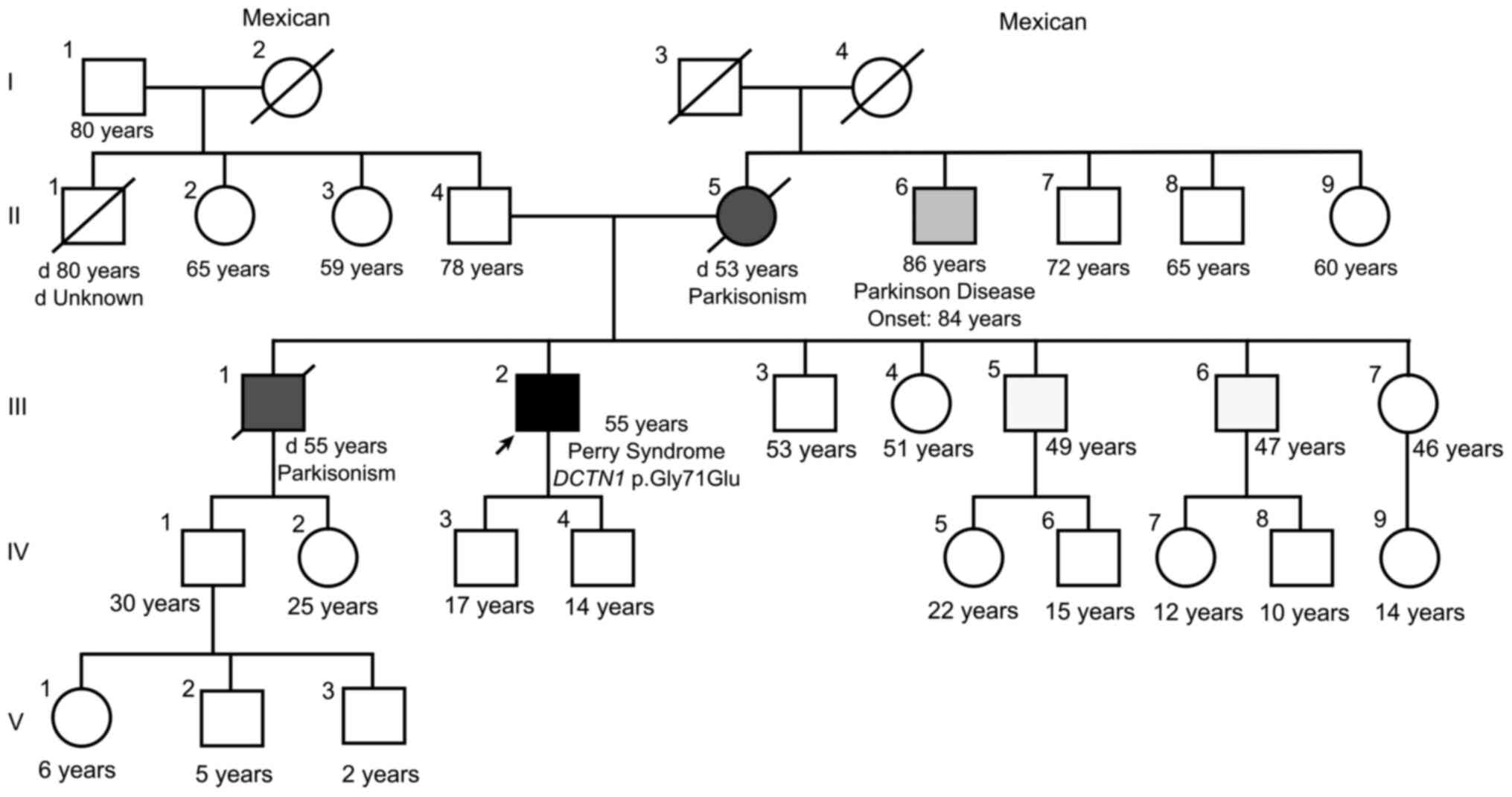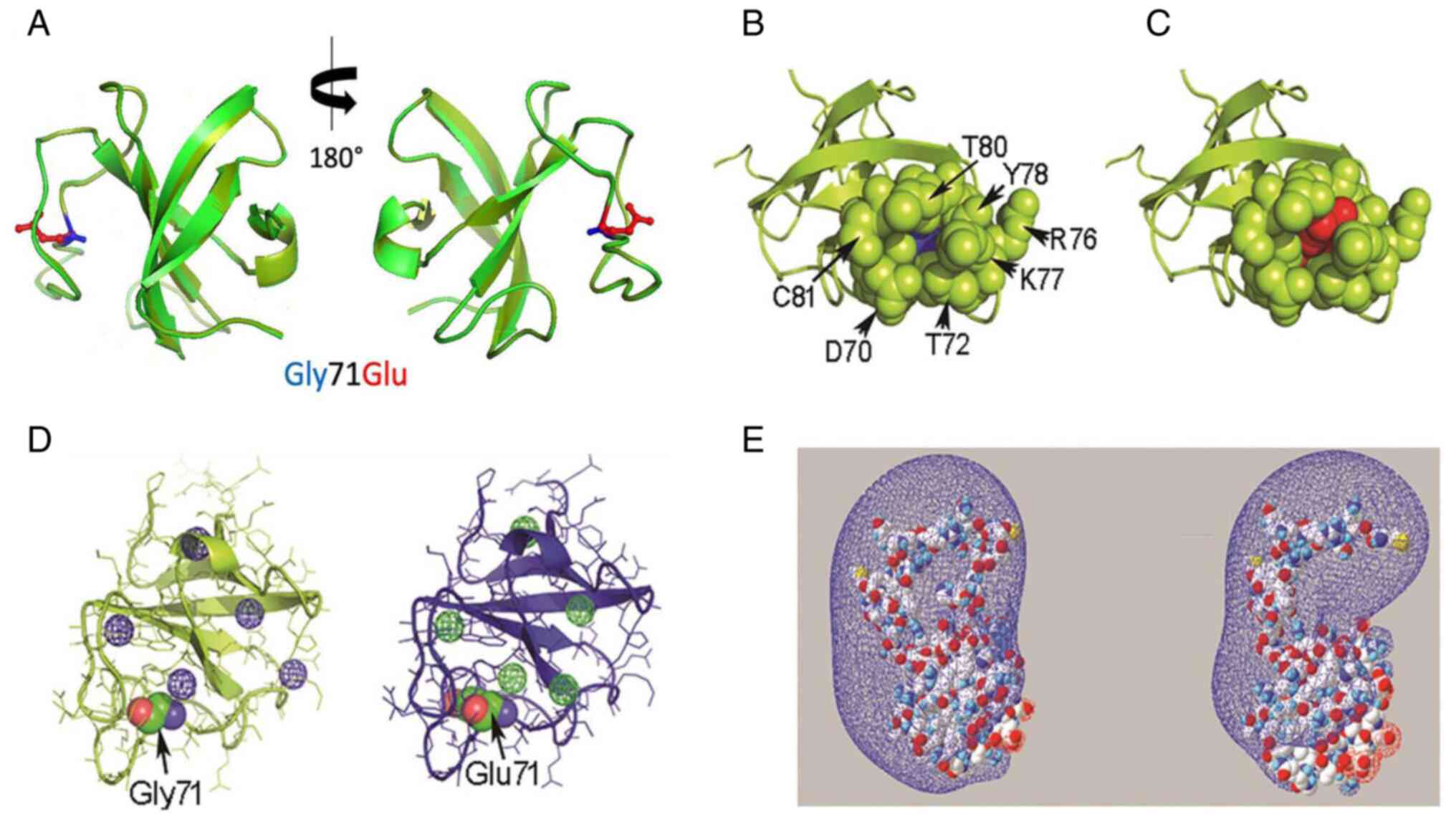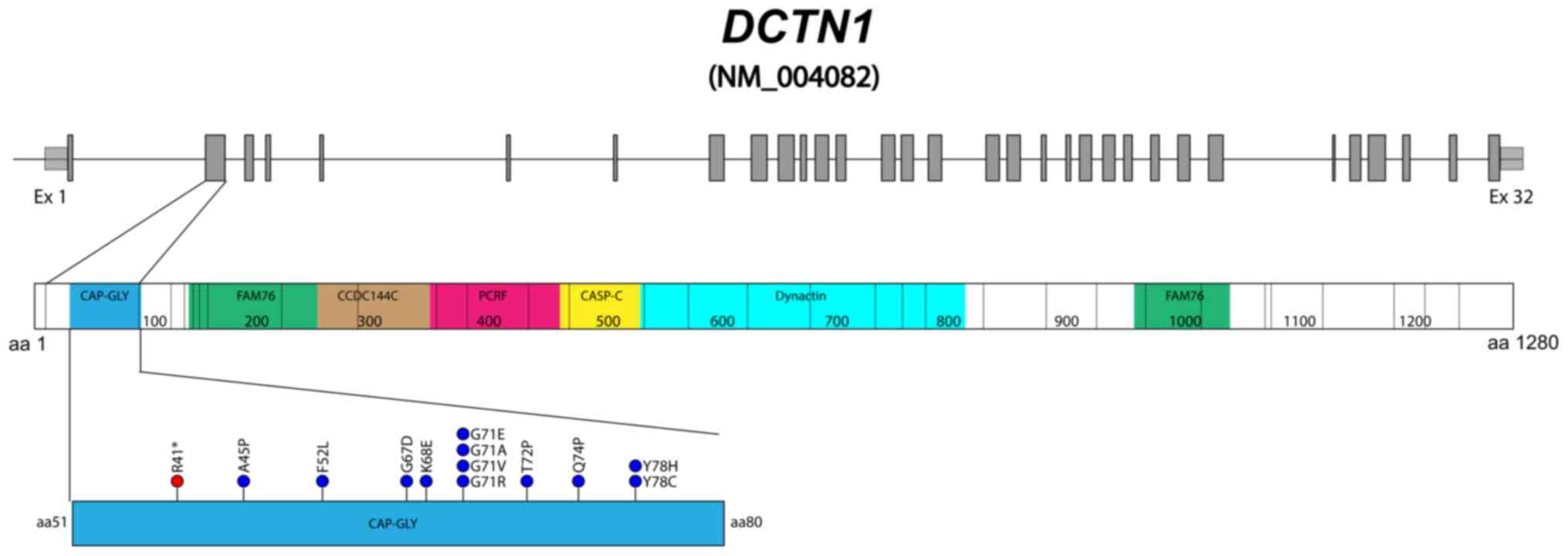|
1
|
Perry TL, Bratty PJ, Hansen S, Kennedy J,
Urquhart N and Dolman CL: Hereditary mental depression and
Parkinsonism with taurine deficiency. Arch Neurol. 32:108–113.
1975.PubMed/NCBI View Article : Google Scholar
|
|
2
|
Tsuboi Y, Mishima T and Fujioka S: Perry
disease: Concept of a new disease and clinical diagnostic criteria.
J Mov Disord. 14:1–9. 2021.PubMed/NCBI View Article : Google Scholar
|
|
3
|
Wider C, Dickson DW, Stoessl AJ, Tsuboi Y,
Chapon F, Gutmann L, Lechevalier B, Calne DB, Personett DA, Hulihan
M, et al: Pallidonigral TDP-43 pathology in Perry syndrome.
Parkinsonism Relat Disord. 15:281–286. 2009.PubMed/NCBI View Article : Google Scholar
|
|
4
|
Mishima T, Koga S, Lin WL, Kasanuki K,
Castanedes-Casey M, Wszolek ZK, Oh SJ, Tsuboi Y and Dickson D:
Perry Syndrome: A Distinctive Type of TDP-43 Proteinopathy. J
Neuropathol Exp Neurol. 76:676–682. 2017.PubMed/NCBI View Article : Google Scholar
|
|
5
|
Farrer MJ, Hulihan MM, Kachergus JM,
Dächsel JC, Stoessl AJ, Grantier LL, Calne S, Calne DB, Lechevalier
B, Chapon F, et al: DCTN1 mutations in Perry syndrome. Nat Genet.
41:163–165. 2009.PubMed/NCBI View
Article : Google Scholar
|
|
6
|
Holzbaur EL and Tokito MK: Localization of
the DCTN1 gene encoding p150Glued to human chromosome 2p13 by
fluorescence in situ hybridization. Genomics. 31:398–399.
1996.PubMed/NCBI View Article : Google Scholar
|
|
7
|
Holzbaur EL and Vallee RB: DYNEINS:
Molecular structure and cellular function. Annu Rev Cell Biol.
10:339–372. 1994.PubMed/NCBI View Article : Google Scholar
|
|
8
|
Gauthier LR, Charrin BC, Borrell-Pagès M,
Dompierre JP, Rangone H, Cordelières FP, De Mey J, MacDonald ME,
Lessmann V, Humbert S and Saudou F: Huntingtin controls
neurotrophic support and survival of neurons by enhancing BDNF
vesicular transport along microtubules. Cell. 118:127–138.
2004.PubMed/NCBI View Article : Google Scholar
|
|
9
|
Wider C and Wszolek ZK: Rapidly
progressive familial parkinsonism with central hypoventilation,
depression and weight loss (Perry syndrome)-a literature review.
Parkinsonism Relat Disord. 14:1–7. 2008.PubMed/NCBI View Article : Google Scholar
|
|
10
|
Konno T, Ross OA, Teive HAG, Sławek J,
Dickson DW and Wszolek ZK: DCTN1-related neurodegeneration: Perry
syndrome and beyond. Parkinsonism Relat Disord. 41:14–24.
2017.PubMed/NCBI View Article : Google Scholar
|
|
11
|
Puls I, Oh SJ, Sumner CJ, Wallace KE,
Floeter MK, Mann EA, Kennedy WR, Wendelschafer-Crabb G, Vortmeyer
A, Powers R, et al: Distal spinal and bulbar muscular atrophy
caused by dynactin mutation. Ann Neurol. 57:687–694.
2005.PubMed/NCBI View Article : Google Scholar
|
|
12
|
Caroppo P, Le Ber I, Clot F,
Rivaud-Péchoux S, Camuzat A, De Septenville A,
Boutoleau-Bretonnière C, Mourlon V, Sauvée M, Lebouvier T, et al:
DCTN1 mutation analysis in families with progressive supranuclear
palsy-like phenotypes. JAMA Neurol. 71:208–215. 2014.PubMed/NCBI View Article : Google Scholar
|
|
13
|
Bolger AM, Lohse M and Usadel B:
Trimmomatic: A flexible trimmer for Illumina sequence data.
Bioinformatics. 30:2114–2120. 2014.PubMed/NCBI View Article : Google Scholar
|
|
14
|
Li H and Durbin R: Fast and accurate short
read alignment with Burrows-Wheeler transform. Bioinformatics.
25:1754–1760. 2009.PubMed/NCBI View Article : Google Scholar
|
|
15
|
McKenna A, Hanna M, Banks E, Sivachenko A,
Cibulskis K, Kernytsky A, Garimella K, Altshuler D, Gabriel S, Daly
M and DePristo MA: The genome analysis toolkit: A MapReduce
framework for analyzing next-generation DNA sequencing data. Genome
Res. 20:1297–1303. 2010.PubMed/NCBI View Article : Google Scholar
|
|
16
|
Kumar P, Henikoff S and Ng PC: Predicting
the effects of coding non-synonymous variants on protein function
using the SIFT algorithm. Nat Protoc. 4:1073–1781. 2009.PubMed/NCBI View Article : Google Scholar
|
|
17
|
Adzhubei IA, Schmidt S, Peshkin L,
Ramensky VE, Gerasimova A, Bork P, Kondrashov AS and Sunyaev SR: A
method and server for predicting damaging missense mutations. Nat
Methods. 7:248–289. 2010.PubMed/NCBI View Article : Google Scholar
|
|
18
|
Schwarz JM, Cooper DN, Schuelke M and
Seelow D: MutationTaster2: Mutation prediction for the
deep-sequencing age. Nat Methods. 11:361–362. 2014.PubMed/NCBI View Article : Google Scholar
|
|
19
|
Waterhouse A, Bertoni M, Bienert S, Studer
G, Tauriello G, Gumienny R, Heer FT, de Beer TAP, Rempfer C,
Bordoli L, et al: SWISS-MODEL: Homology modelling of protein
structures and complexes. Nucleic Acids Res. 46(W1):W296–W303.
2018.PubMed/NCBI View Article : Google Scholar
|
|
20
|
Rigsby RE and Parker AB: Using the PyMOL
application to reinforce visual understanding of protein structure.
Biochem Mol Biol Educ. 44:433–437. 2016.PubMed/NCBI View Article : Google Scholar
|
|
21
|
Rother K, Hildebrand PW, Goede A, Gruening
B and Preissner R: Voronoia: Analyzing packing in protein
structures. Nucleic Acids Res. 37(Database issue):D393–D395.
2009.PubMed/NCBI View Article : Google Scholar
|
|
22
|
Guex N and Peitsch MC: SWISS-MODEL and the
Swiss-PdbViewer: An environment for comparative protein modeling.
Electrophoresis. 18:2714–2723. 1997.PubMed/NCBI View Article : Google Scholar
|
|
23
|
Weisbrich A, Honnappa S, Jaussi R,
Okhrimenko O, Frey D, Jelesarov I, Akhmanova A and Steinmetz MO:
Structure-function relationship of CAP-Gly domains. Nat Struct Mol
Biol. 14:959–967. 2007.PubMed/NCBI View Article : Google Scholar
|
|
24
|
Karczewski KJ, Francioli LC, Tiao G,
Cummings BB, Alföldi J, Wang Q, Collins RL, Laricchia KM, Ganna A,
Birnbaum DP, et al: The mutational constraint spectrum quantified
from variation in 141,456 humans. Nature. 581:434–443.
2020.PubMed/NCBI View Article : Google Scholar
|
|
25
|
Richards S, Aziz N, Bale S, Bick D, Das S,
Gastier-Foster J, Grody WW, Hegde M, Lyon E, Spector E, et al:
Standards and guidelines for the interpretation of sequence
variants: A joint consensus recommendation of the American College
of Medical Genetics and Genomics and the Association for Molecular
Pathology. Genet Med. 17:405–424. 2015.PubMed/NCBI View Article : Google Scholar
|
|
26
|
Pretelt F, Castañeda Cardona C, Tacik P,
Ross OA and Wszolek ZK: Latin America's first case of Perry
syndrome and a new treatment option for respiratory insufficiency.
J Neurol. 261:620–621. 2014.PubMed/NCBI View Article : Google Scholar
|
|
27
|
Silva E, Itzcovich T, Niikado M, Caride A,
Fernández E, Vázquez JC, Romorini L, Marazita M, Sevlever G,
Martinetto H and Surace EI: Perry disease in an Argentine family
due to the DCTN1 p.G67D variant. Parkinsonism Relat Disord.
97:63–64. 2022.PubMed/NCBI View Article : Google Scholar
|
|
28
|
Tacik P, Fiesel FC, Fujioka S, Ross OA,
Pretelt F, Castañeda Cardona C, Kidd A, Hlavac M, Raizis A, Okun
MS, et al: Three families with Perry syndrome from distinct parts
of the world. Parkinsonism Relat Disord. 20:884–888.
2014.PubMed/NCBI View Article : Google Scholar
|
|
29
|
Denson MA and Wszolek ZK: Familial
parkinsonism: Our experience and review. Parkinsonism Relat Disord.
1:35–46. 1995.PubMed/NCBI View Article : Google Scholar
|
|
30
|
Dulski J, Koga S, Prudencio M, Tipton PW,
Ali S, Strongosky AJ, Rose JH, Parrales ZA, Dunmore JA, Jansen-West
K, et al: Perry syndrome: Novel DCTN1 mutation in a large kindred
and first observation of prodromal disease. Parkinsonism Relat
Disord. 112(105481)2023.PubMed/NCBI View Article : Google Scholar
|
|
31
|
Mishima T, Ishikawa T, Imamura K, Kondo T,
Koshiba Y, Takahashi R, Takahashi J, Watanabe A, Fujii N, Tsuboi Y
and Inoue H: Cytoplasmic aggregates of dynactin in iPSC-derived
tyrosine hydroxylase-positive neurons from a patient with Perry
syndrome. Parkinsonism Relat Disord. 30:67–72. 2016.PubMed/NCBI View Article : Google Scholar
|
|
32
|
Dulski J, Koga S, Liberski PP, Sitek EJ,
Butala AA, Sławek J, Dickson DW and Wszolek ZK: Perry disease:
Expanding the genetic basis. Mov Disord Clin Pract. 10:1136–1142.
2023.PubMed/NCBI View Article : Google Scholar
|
|
33
|
Tian W, Yao L, Shi G, Dai R and Cao L: A
novel DCTN1 mutation causing perry syndrome leads to abnormal
splicing of mRNA: Genetic and functional analyses. Acta Neurol
Belg. 124:661–663. 2024.PubMed/NCBI View Article : Google Scholar
|
|
34
|
Araki E, Tsuboi Y, Daechsel J, Milnerwood
A, Vilarino-Guell C, Fujii N, Mishima T, Oka T, Hara H, Fukae J and
Farrer MJ: A novel DCTN1 mutation with late-onset parkinsonism and
frontotemporal atrophy. Mov Disord. 29:1201–1204. 2014.PubMed/NCBI View Article : Google Scholar
|
|
35
|
Cady J, Allred P, Bali T, Pestronk A,
Goate A, Miller TM, Mitra RD, Ravits J, Harms MB and Baloh RH:
Amyotrophic lateral sclerosis onset is influenced by the burden of
rare variants in known amyotrophic lateral sclerosis genes. Ann
Neurol. 77:100–113. 2015.PubMed/NCBI View Article : Google Scholar
|
|
36
|
Gustavsson EK, Trinh J, Guella I, Szu-Tu
C, Khinda J, Lin CH, Wu RM, Stoessl J, Appel-Cresswell S, McKeown
M, et al: DCTN1 p.K56R in progressive supranuclear palsy.
Parkinsonism Relat Disord. 28:56–61. 2016.PubMed/NCBI View Article : Google Scholar
|
|
37
|
Dulski J, Cerquera-Cleves C, Milanowski L,
Kidd A, Sitek EJ, Strongosky A, Vanegas Monroy AM, Dickson DW, Ross
OA, Pentela-Nowicka J, et al: Clinical, pathological and genetic
characteristics of Perry disease-new cases and literature review.
Eur J Neurol. 28:4010–4021. 2021.PubMed/NCBI View Article : Google Scholar
|
|
38
|
Hayashi I, Wilde A, Mal TK and Ikura M:
Structural basis for the activation of microtubule assembly by the
EB1 and p150Glued complex. Mol Cell. 19:449–460. 2005.PubMed/NCBI View Article : Google Scholar
|
|
39
|
Yan S, Zhang H, Hou G, Ahmed S, Williams
JC and Polenova T: Internal dynamics of dynactin CAP-Gly is
regulated by microtubules and plus end tracking protein EB1. J Biol
Chem. 290:1607–1622. 2015.PubMed/NCBI View Article : Google Scholar
|
|
40
|
Zwarycz AS, Fossat M, Akanyeti O, Lin Z,
Rosenman DJ, Garcia AE, Royer CA, Mills KV and Wang C: V67L
mutation fills an internal cavity to stabilize RecA Mtu Intein.
Biochemistry. 56:2715–2722. 2017.PubMed/NCBI View Article : Google Scholar
|
|
41
|
Fernández A and Berry RS: Proteins with
H-bond packing defects are highly interactive with lipid bilayers:
Implications for amyloidogenesis. Proc Natl Acad Sci USA.
100:2391–2396. 2003.PubMed/NCBI View Article : Google Scholar
|
|
42
|
Deshimaru M, Kinoshita-Kawada M, Kubota K,
Watanabe T, Tanaka Y, Hirano S, Ishidate F, Hiramoto M, Ishikawa M,
Uehara Y, et al: DCTN1 Binds to TDP-43 and Regulates TDP-43
Aggregation. Int J Mol Sci. 22(3985)2021.PubMed/NCBI View Article : Google Scholar
|
|
43
|
Zhang Z, Witham S and Alexov E: On the
role of electrostatics in protein-protein interactions. Phys Biol.
8(035001)2011.PubMed/NCBI View Article : Google Scholar
|
|
44
|
Vendruscolo M, Zurdo J, MacPhee CE and
Dobson CM: Protein folding and misfolding: A paradigm of
self-assembly and regulation in complex biological systems. Philos
Trans A Math Phys Eng Sci. 361:1205–1222. 2003.PubMed/NCBI View Article : Google Scholar
|

















